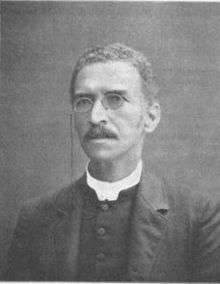Francis James Grimké



Francis James Grimké (October 10, 1850[1] – October 11, 1937) was an American Presbyterian minister in Washington, DC who was prominent in working for equal rights for African Americans. He was active in the Niagara Movement and helped found the National Association for the Advancement of Colored People (NAACP) in 1909.
Early life and education
Francis Grimké was the second of three sons: Archibald and John were his brothers, born to Henry Grimké, a white (European-American) slaveholder of Charleston, South Carolina, and Nancy Weston, an enslaved woman of European and African descent. After having become a widower, the senior Grimke had begun a relationship with Weston. It appeared to be a caring one; he moved with her out of the city to his plantation where they and their family would have more privacy. She was his official domestic partner in the house. He and Nancy gave the boys their first lessons in reading and writing.
Henry Grimké was the brother of Sarah and Angelina Grimke, who moved to the North after becoming abolitionists. His other siblings continued to represent and carry out expected roles, as he mostly did, their prominent slaveholding family of Charleston.
Discovery
Henry Grimke died in 1852. Francis and his family went through many hardships afterward, as he had not provided for them financially. After the Civil War, which disrupted family fortunes further, Francis and Archibald were enrolled in the Charleston public schools, a segregated system set up for the first time during the Reconstruction era by a Republican-dominated, biracial legislature. They were sponsored by Mrs. Pillsbury, sister-in-law of Parker Pillsbury, for higher education at Lincoln University, founded in Pennsylvania for the education of blacks. They received tuition from a church committee, but had no money for books and clothing.
In 1868, Angelina Grimké noted Archibald Grimké's surname in The Anti-Slavery Standard, after a speech of his was reported. Because of the unusual name, she wrote to learn whether he was related to her family. After learning that he was their nephew, Angelina and Sarah officially acknowledged Archibald and his brothers as family. The sisters supported the three boys while they were in college, and opened their home to them. The youngest brother, John Grimké, did not take to education and chose to stay in Charleston with their mother Nancy Weston.
Francis and Archibald both graduated from Lincoln University in 1870. He went on to graduate studies at Princeton Theological Seminary, from which he graduated in 1878.[2] Grimké became ordained as a Presbyterian minister.
Marriage and family
In December 1878, Grimké married Charlotte Forten, an abolitionist, teacher, and diarist. Charlotte was the granddaughter of James Forten, a prominent member of the free black elite of Philadelphia. Among her acquaintances were many members of the national abolitionist movement, including William Lloyd Garrison, Sarah Parker Remond, John Whittier, and Wendell Phillips. Charlotte was 41 and Francis was about 13 years her junior when they married. In 1880, they had one daughter, Theodora Cornelia, who died as an infant.
Career
Grimké began his ministry at the prominent 15th Street Presbyterian Church in Logan Circle, Washington, D.C., a major African-American congregation. He led that congregation for decades, and was active throughout the community in Washington.
His elder brother Archibald was appointed as consul to the Dominican Republic from 1894-1898. During that time, Archibald's daughter Angelina Weld Grimké stayed with Grimké and his wife. Angelina later became a teacher, and a prominent writer and activist in her own right.
Except for a few years' sojourn at a church in Jacksonville, Florida, Grimké continued to lead the Fifteenth Street Presbyterian Church in Washington, D.C. until 1928. He died in 1937, more than twenty years after Charlotte.
Francis Grimké said "Race prejudice can't be talked down, it must be lived down."
References
- ↑ https://books.google.com/books?id=8EYyRsFFpaoC&pg=PA113&lpg=PA113&dq=francis+grimke+october+10&source=bl&ots=eDD3rXJ7Yi&sig=q7oMqTrhIdHu3hns9ONkbzyXf-k&hl=en&sa=X&ved=0CCYQ6AEwAmoVChMIpPO45J64yAIVCTc-Ch3fhQyJ#v=onepage&q=francis%20grimke%20october%2010&f=false
- ↑ Culp, Daniel Wallace (1902). Twentieth century Negro literature; or, A cyclopedia of thought on the vital topics relating to the American Negro. Atlanta: J.L. Nichols & Co. p. 426.
Bibliography
- Carol Sears Botsch (February 18, 1997). "Archibald Grimke". The University of South Carolina-Aiken. Retrieved January 17, 2008.
- Mark R. Bradshaw-Miller (February 20, 2005). "The Life and Witness of Reverend Francis Grimke". Westminster Presbyterian Church. Archived from the original on September 29, 2007. Retrieved January 17, 2008.
- Thomas, Rhondda R. & Ashton, Susanna, eds. (2014). The South Carolina Roots of African American Thought, Columbia: University of South Carolina Press. "Francis Grimke (1850-1937)," p. 117-121.
External links
| Wikiquote has quotations related to: Francis James Grimké |
| Wikimedia Commons has media related to Francis James Grimké. |
- Works by Francis James Grimké at Project Gutenberg
- Works by or about Francis James Grimké at Internet Archive
- Francis J. Grimke at the African American Registry
- Quotes
|